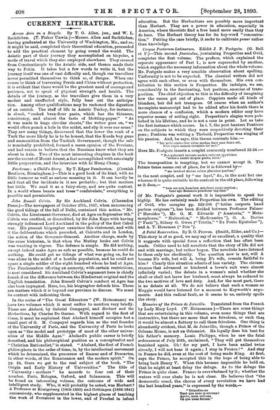Corpus Poetarum Latinorutn. Edidit J. P. Postgate. (G. Bell et
F.)—This second fasciculus, containing Propertius and Ovid, completes the first volume. The preface, which explained the separate appearance of Part I., is now superseded by another, which supplies the necessary information about the whole volume. Mr. Postgate makes a very sensible observation about spelling. Uniformity is not to be expected. The classical writers did not agree with each other, or even with themselves. His own con- tribution to this section is Propertius. He indulges, we see, considerably in the fascinating, but perilous, exercise of trans- position. The chief objection to this is the difficulty of imagining how the verses got out of place. Copyists made all kinds of blunders, but did not transpose. Of course when an author's incomplete manuscript had to be edited after his death there is more chance of a confusion, which a modern editor may have superior means of setting right. Propertius's elegies were pub- lished in his lifetime, and he is not a case in point. Let us take _ the first instance which occurs. In i. 7, the poet banters Ponticus on the subjects to which they were respectively devoting their pens ; Ponticus was writing a Thebaid, Propertius was singing of his passion. And, he says, this theme contents him :— " hie mihi contel itar uitae modus, haec men fame eat, hips cupio nomen carmine ire mei."
Here Mr. Postgate inserts a couplet commonly numbered 23-24 :—
" NE° poterunt luvenes nostro retic3re sepulchre ardoris nostri magne poets, laces. "
The transposition is tempting, but we cannot accept it. The future tense seems out of place, for it is followed by— "me laudent &wise opium placaisse pnellae," in the next couplet, and by " me legal," &c., in the next but one whereas it is quite suitable to its context in the old place, following
as it does,—
" tam me non humilem mirabero saepe poetam ; tune ego Romanis praeferar ingenila."
Of Mr. Postgate's general work it is impossible to speak too highly. He has certainly made Propertius his own. The editing of Ovid, who occupies pp. 322-596 (" totius corporis baud partem exiguam "), has been divided between Professor Palmer (" Heroides "), Mr. G. M. Edwards (" Amatoria," " Meta- morphoses," " Halieutica," " Medicamina "), G. A. Davies (" Pesti"), Sidney G. Owen (" Tristia," " Ex Ponto Epistulae "), and A. T. Housman (" This ").






































 Previous page
Previous page